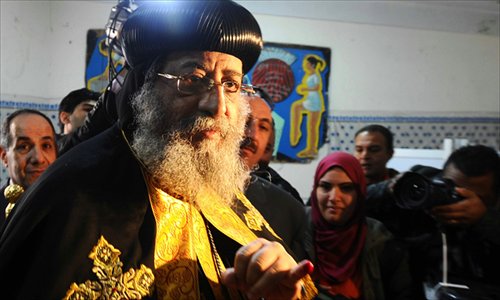Army chief to run after Egypt constitution vote

Pope Tawadros II, head of the Egyptian Coptic Orthodox Church, shows his ink-stained finger after casting his vote on a new constitution in Cairo on Tuesday. Photo: AFP
Egypt began a two-day referendum for a new constitution on Tuesday, which may set the stage for a presidential bid by army chief General Abdel Fattah al-Sisi who ousted former president Mohamed Morsi in July 2013.
The referendum has been billed by authorities as the first in a series of polls that will restore elected government by the end of the year.
Experts said that the referendum would be a key step for Egypt to stabilize and rebuild domestic political order.
A Global Times reporter on the ground saw many Egyptians lining up outside polling stations to vote on the new constitution on Tuesday.
"I think I have a duty to vote in the referendum, which is a way to express my love and respect for the country," a woman named Karimate, 80, told the Global Times.
Karimate said she and her family all supported the current defense minister General Sisi to be president of Egypt.
Sisi is widely expected to run for president, and he appeared on Saturday to link his presidential bid to the referendum result, saying he would need the support of the nation and the army to run.
Houssein Ismail, an Egyptian politics analyst, told the Global Times that it has been an "open secret" that Sisi was popular among citizens. "Currently Egypt needs a powerful leader who has wide popularity in the country."
Egypt's top election commission told reporters Sunday that there are around 53.4 million registered voters for the constitution referendum and the result would be released within 78 hours of the referendum ending.
The commission also said voting by 0.68 million overseas voters had already finished on Sunday, with an estimated 90 percent approving the referendum.
The referendum will be followed by parliamentary and presidential elections.
The new charter has done away with much of the Islamist-inspired wording of Morsi's constitution, suspended on his overthrow, and its supporters say it expands women's rights and freedom of speech.
But it has bolstered the military's powers, granting the army the right to appoint the defense minister for the next eight years and to try civilians for attacks on the armed forces.
Tang Zhichao, an associate research fellow with the Institute of West Asian and African Studies at the Chinese Academy of Social Sciences, told the Global Times that the referendum would help Sisi and the army to further legitimize its ouster of former president Morsi and the military hopes to form a strong and stable political power in Egypt.
An Islamist coalition led by the former president's Muslim Brotherhood, designated as a terrorist organization by the military-installed authorities, had called for a boycott and protests during the polling.
A small bomb exploded outside a Cairo court shortly before polls opened on Tuesday morning, even as hundreds of thousands of soldiers and police were deployed to guard polling stations.
The blast caused no injuries, but a hospital official said one man was killed in clashes between the Islamists and civilian opponents in the central province of Beni Sweif, while police dispersed small pro-Morsi rallies elsewhere in the country.
"Though the Brotherhood has been designated as a terrorist organization, the divergence between Islamists and secularists hasn't been erased," said Tian Wenlin, a research fellow in Middle Eastern studies at the China Institute of Contemporary International Relations. Tian also told the Global Times that many people in Egypt still support the Brotherhood.
Agencies contributed to this story